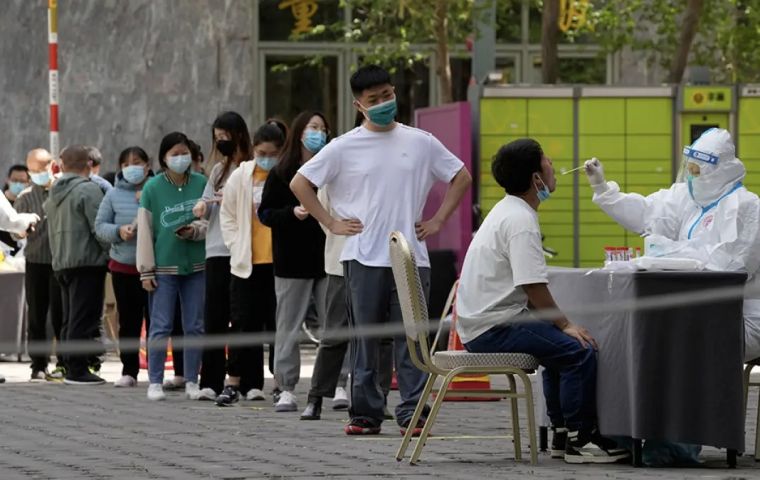MercoPress. South Atlantic News Agency
Chinese citizens, economy fear measures more than they fear COVID-19 itself
 “COVID-19 won't kill us, hunger will” a Chinese citizen under lockdown posted on the internet before censorship removed the message
“COVID-19 won't kill us, hunger will” a Chinese citizen under lockdown posted on the internet before censorship removed the message The COVID-19 pandemic has almost the whole world going in one direction and China doing quite the opposite and measures of the utmost severity have led to the strict confinement of some 343 million people to enforce a “zero-tolerance” policy as cases of the Omicron variant keep being detected through mass, compulsory testing.
According to the French bank Societe Generale, the provinces subject to mobility restrictions account for 80% of China's GDP, which represents a major risk for economic growth, due to which analysts have lowered their projections for 2022 from 5 to 4.2%.
As a result of the lockdown, production and logistics have been affected in an unprecedented manner, in addition to a nearly full stop in local consumption of goods and services.
Premier Li Keqianq had announced earlier last month a growth target for this year of “around 5.5%,” the lowest in the last 30 years.
International observers already speak of a “cruel” life imposed on Shanghai residents confined to their homes in an eerie echo of the lockdown imposed on the central city of Wuhan in 2020 after the virus first emerged.
While the rest of the world tries to live with the virus, people in Shanghai took to journals, video, audio, WeChat notes and Weibo posts to vent their frustrations and ask whether the endless confinement even made sense, which led to the Chinese Government upping its censorship tools to keep cries of despair from going viral.
“The primary goal of CCP (Chinese Communist Party) censorship is to prevent large-scale collective action,” said Zachary Steinert-Threlkeld, a professor at the University of California – Los Angeles (UCLA) who studies protest movements and online censorship. “The censoring is counterproductive if one thinks the goal is to prevent disgruntlement about the lockdown from spreading, but it is productive if it prevents upset individuals from coordinating action outside of their homes.”
Chinese residents have been reported to exhaust their creativity to outwit local authorities and convey their messages to the world. Some tried to re-post deleted articles or comments using different methods, such as uploading a mirror image of the original photos or translating articles into English to share daring messages across social media.
“Stand up, those who do not want to be slaves” – the opening line of the Chinese national anthem – suddenly became a sentence too daring to be seen on social media, making rounds on Weibo, China’s version of Twitter, before the topic was wiped. Both Twitter and Instagram are blocked in China.
“It just felt like Wuhan all over again, and I’m still struggling to understand why censors would delete posts that basically were only people asking for help,” Billy, a Shanghai resident who asked to use a pseudonym, told Al Jazeera. “None of this makes any sense.” But experts say it makes sense to the Chinese government, which aims to prevent the emergence of any kind of mass movement that could potentially threaten its rule.
Fuelled by their frustration at the city authorities’ apparent failure in maintaining food supply and the government’s commitment to ‘zero COVID’, Shanghai residents have proved unusually vocal. Shanghai is also the most international city in China and home to some of the country’s most educated people, as well as a large number of foreigners and an army of social media influencers.
“The virus won’t kill us, but hunger will,” said a man who summed up the feelings of the local population who has long stopped fearing SARS-CoV-2 to focus on starvation and mental issues stemming from their isolation.
As April drew to a close, more than 12 million people in Shanghai were told on Friday they would be able to leave their homes – under certain conditions. However, more than five million remain under strict lockdown, and there is little sign of the much-vaunted ‘normal life’ that the Chinese government has long boasted was possible because of its ‘zero COVID’ strategy.
As authorities in Beijing announced mass testing, the lockdown-scarred residents of Shanghai had a warning for people in the capital. “Please stock up your fridge now, leave Beijing now if you can, and no matter what, don’t believe everything the government tells you,” Ding, a Shanghai resident, wrote on her WeChat soon after the campaign was announced.
On Thursday, Guangzhou, a major trade and manufacturing hub in southern China, announced mass testing for almost a third of its near 19 million residents after an “abnormal” test result was detected at its airport, where most flights have been canceled, while the tech hub of Hangzhou near Shanghai has ordered 9.4 million downtown residents out of its 12.2 million population to get tested every 48 hours if they want to access public spaces and transport.




Top Comments
Disclaimer & comment rulesCommenting for this story is now closed.
If you have a Facebook account, become a fan and comment on our Facebook Page!